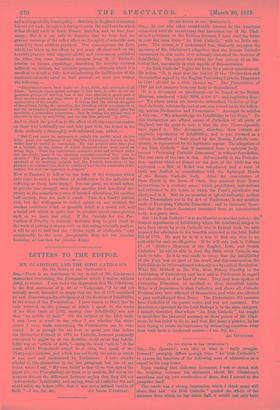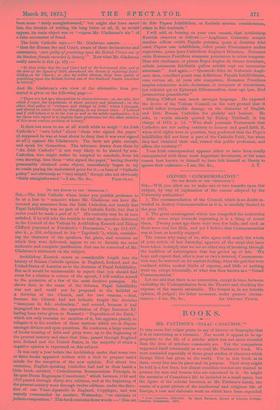(TO THE EDITOR 07 THE " SPECTATOR:1
SIR,—The Spectator's own idea of what is "fairly straight- forward" probably differs enough from "An Irish Catholic's 't to ensure the insertion of the following note of admiration as a sequel to his long letter.
Upon reading that elaborate document, I was so struck with the variation between his statement about Mr. Gladstone's- aasertions and my own recollection of them, that I turned to the- pamphlet itself.
The result was a strong impression, which I think many will share, that had "An Irish Catholic" quoted the whole of the sentence from which he has taken half, it would not only have
been more "fairly straightforward," but might also have saved him the trouble of writing his long letter at all, if, as would appear, its main object was to "expose Mr. Gladstone's sin" of a false accusation of fraud.
The Irish Catholic says :—" Mr. Gladstone asserts 4' that the Roman See and Court, aware of these declarations and assurances, were guilty of practising upon the British Crown one of the blackest frauds recorded in history." Now what Mr. Gladstone really asserts is this (p. 49) :— " So that either that See and Court had at the last-named date, and at the date of the Synod of 1810, abandoned the dream of enforcing Infal- libility on the Church ; or else, by wilful silence, they were guilty of practising upon the British Crown one of the blackest frauds recorded in history."
And Mr. Gladstone's own view of the alternative thus pre- sented is given on the following page :—
" There are but tFo alternatives to choose between: on one side, that which I reject, the hypothesis of sheer perjury and falsehood; on the other, that policy of violence and change in faith' which I charged, and stirred so much wrath by charging, in my former tract. I believed and 1 still believe it to be the true as well as the milder explanation; it is for those who reject it to explain their preference for the other solution of this most curious problem of history."
It does not seem to me at all worth while to weigh "An Irish Catholic's " "own belief" about "those who signed the paper" (I supposed he was at least about to deny that it was ever signed at all !) against Mr. Gladstone's. The facts are plain enough, and speak for themselves. The inference drawn from them by "An, Irish Catholic" is not very likely to be shared by non- Catholics, who might rather be tempted to conclude, from his -own showing, that those "who signed the paper," having thereby presumably obtained some object, immediately began to try to evade paying the understood price for it,—a form of "Catholic policy" not obviously so "very stupid," though also not obviously
"fairly straightforward."—I am, Sir, &c., FAIR-FLAY.



































 Previous page
Previous page